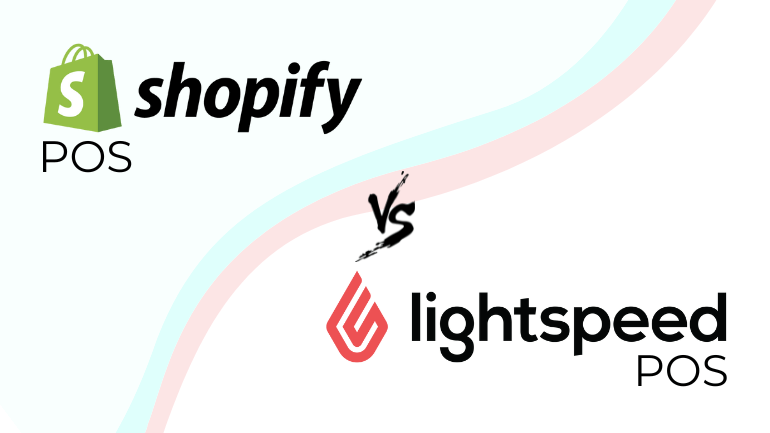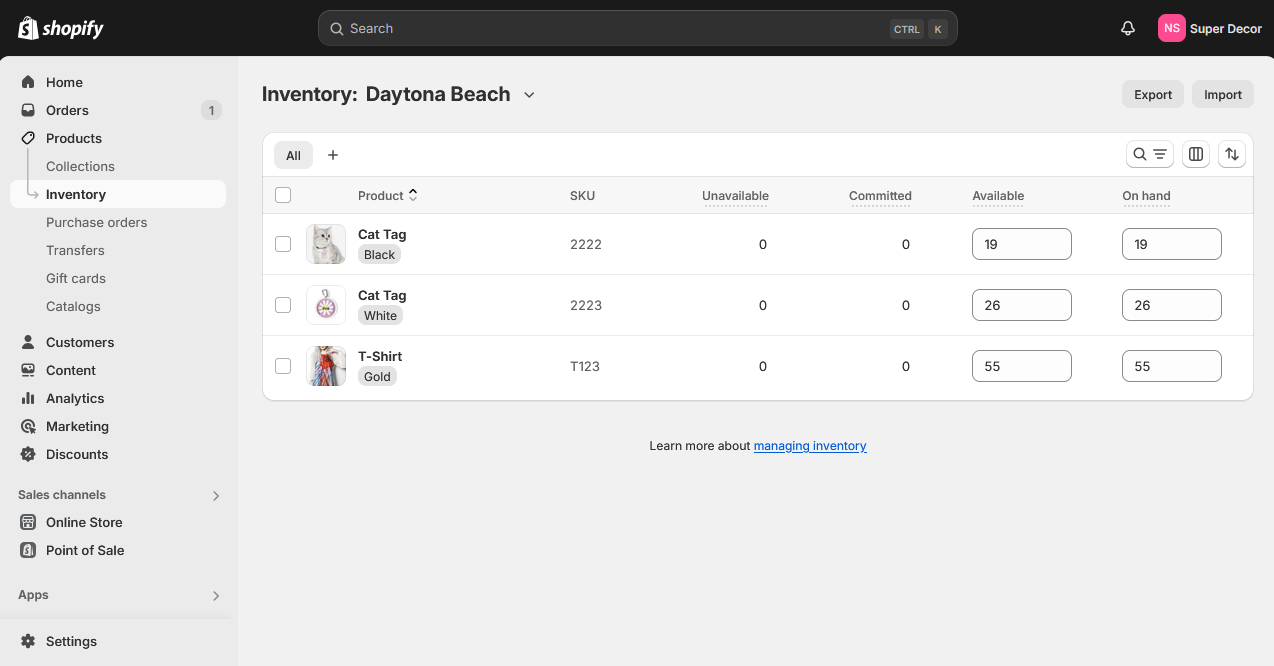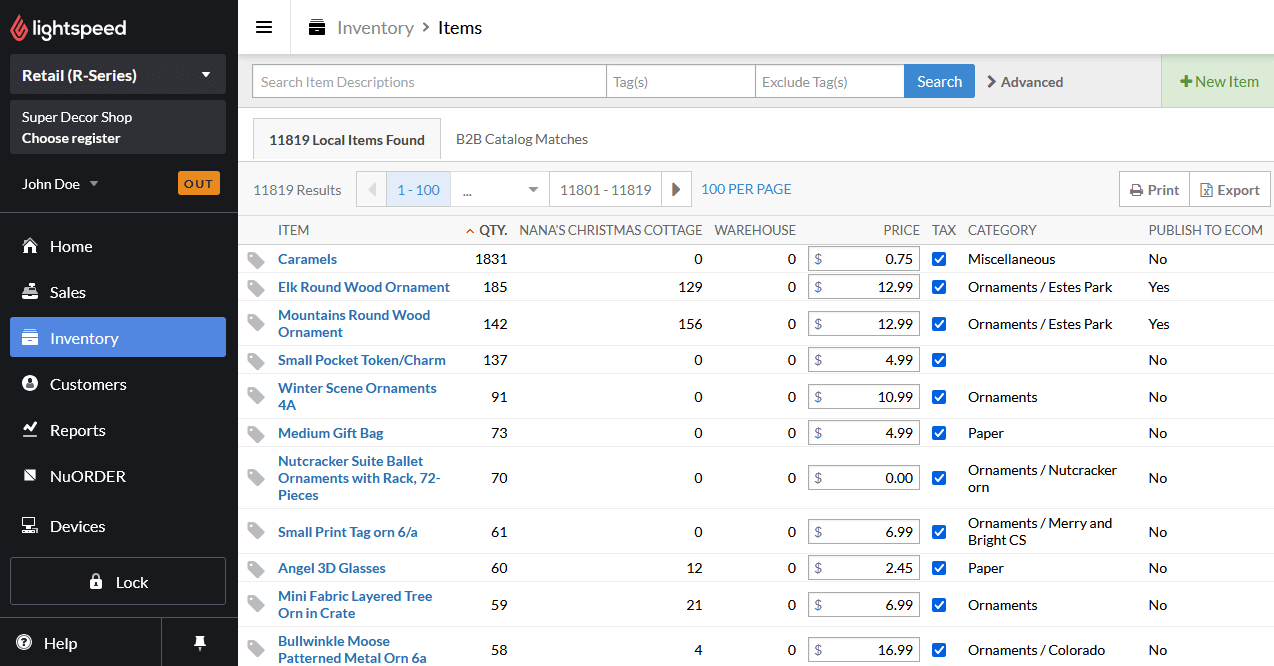
Point-of-sale (POS) systems are essential for businesses managing in-store sales, helping streamline operations, process payments, and integrate with online platforms. Two popular contenders in the POS space are Shopify POS and Lightspeed POS. Both platforms cater to different business needs, but how do they compare? Let’s dive into the details.
Overview
Shopify POS

Shopify POS
Shopify POS is an extension of the Shopify ecosystem, designed to unify online and in-store operations. Retailers can leverage Shopify’s tools to manage inventory, sales, and customer data seamlessly across all channels. With its integration into Shopify Online Store, Shopify POS provides a cohesive experience for businesses looking to blend eCommerce with brick-and-mortar operations.
Target Audience: Retailers with both online and offline presence.
Strengths: Simplified setup, seamless online-to-offline integration, and compatibility with Shopify’s ecosystem of tools and apps. Shopify POS also includes flexible pricing options and hardware tailored to various business sizes.
Lightspeed POS

Lightspeed R-Series POS
Lightspeed POS is known for its robust and feature-rich tools tailored for retail, hospitality, and service-based businesses. With capabilities like advanced inventory management, multi-location support, and comprehensive analytics, Lightspeed POS is well-suited for complex retail environments and dynamic industries like restaurants and service providers.
Target Audience: Brick-and-mortar retailers, hospitality businesses, and multi-location stores.
Strengths: Advanced inventory management, customizable workflows, and tools designed for specific industries. Lightspeed also offers a range of integrations and detailed analytics to help businesses optimize operations.
Strengths of Shopify POS
Unified Ecosystem
Shopify POS seamlessly integrates with Shopify Online Store, enabling businesses to sync inventory, customer data, and sales effortlessly between online and offline channels. This integration creates a smooth omnichannel experience for businesses expanding across platforms.
Ease of Use
Shopify POS’s intuitive interface and quick setup process make it accessible for business owners without technical expertise. New users can start using the platform with minimal training.
Customizable Hardware
Shopify POS provides a variety of hardware options, such as card readers, barcode scanners, and receipt printers. These tools are designed to meet the needs of small retailers and larger enterprises alike, with easy integration into the Shopify ecosystem.
Integrated Payments
Shopify Payments simplifies transactions by offering built-in payment processing with competitive rates. This eliminates the need for third-party payment processors and ensures a smoother checkout experience.
Scalability
Whether you’re operating a single store or managing multiple locations, Shopify POS grows with your business. Features like advanced reporting, staff permissions, and multi-location support help businesses adapt as they scale.
Strengths of Lightspeed POS
Powerful Inventory Management
Lightspeed POS is renowned for its sophisticated inventory features. Businesses can manage bulk imports, track matrix inventory (e.g., variations like size and color), and receive automated low-stock alerts. This makes Lightspeed ideal for businesses with extensive or complex product catalogs.
Industry-Specific Tools
Lightspeed POS offers tailored features for industries like retail and hospitality. For example, restaurants can benefit from table management and menu customization, while retail stores enjoy advanced categorization and vendor management.
Comprehensive Reporting and Analytics
With detailed sales reports, employee performance metrics, and inventory insights, Lightspeed POS helps businesses make data-driven decisions. The platform’s robust analytics provide actionable insights to optimize operations and boost profitability.
Multi-Location Management
Managing inventory and sales across multiple locations is simple with Lightspeed POS. It consolidates data from different stores into one platform, ensuring consistency and reducing administrative overhead.
Third-Party Integrations
Lightspeed POS integrates seamlessly with tools like QuickBooks, Xero, and various eCommerce platforms. These integrations allow businesses to customize their operations and streamline workflows.
Pricing Comparison
| Shopify POS | Lightspeed POS | |
|---|---|---|
| Starting Price | $5/month (Shopify POS Lite) | $109/month (Retail Basic Plan) |
| Advanced Features | $89/month (Shopify POS Pro) | $179/month (Retail Advanced Plan) |
| Hardware Costs | Additional purchase required | Additional purchase required |
| Credit Card Processing Fees | Starts at 2.4% + 0¢ per transaction | Starts at 2.6% + 10¢ per transaction |
| Free Trial | Yes (3 days) | Yes (14 days) |
(Note: Pricing details are subject to change. Always verify with the respective provider.)
Key Differences
Integration with Online Platforms
Shopify POS provides seamless integration with Shopify Online Store, making it an ideal choice for businesses heavily invested in eCommerce.
Lightspeed POS supports multiple eCommerce platforms, including Shopify, WooCommerce, and Magento, offering more flexibility for businesses using various platforms.
Industry Focus
Shopify POS targets retail businesses but lacks specialized tools for other industries.
Lightspeed POS offers tailored solutions for industries like hospitality, making it a better fit for restaurants and service-based businesses.
Learning Curve
Shopify POS’s user-friendly design ensures quick onboarding and minimal training requirements.
Lightspeed POS offers advanced features that come with a steeper learning curve but provide greater customization.
Which Platform Should You Choose?
Choose Shopify POS if:
Your business heavily relies on Shopify Online Store for eCommerce.
You value simplicity, ease of use, and seamless online-to-offline integration.
Scalability for multi-location retail operations is important to you.
Choose Lightspeed POS if:
Your business requires advanced inventory management and robust analytics.
You operate in the hospitality industry or manage complex, multi-location setups.
Customization and industry-specific tools are priorities for your business.
Conclusion
Shopify POS and Lightspeed POS cater to businesses with varying needs. Shopify POS is ideal for retailers seeking simplicity and tight integration with eCommerce, while Lightspeed POS offers advanced inventory tools and features tailored for retail and hospitality.
Your choice should depend on your operational complexity and industry requirements. Whichever you choose, both platforms are designed to help you streamline in-store operations and grow your business.
For a broader look at how Shopify and Lightspeed compare in the eCommerce landscape, don’t miss our comprehensive comparison of Shopify Online Store and Lightspeed eCom.